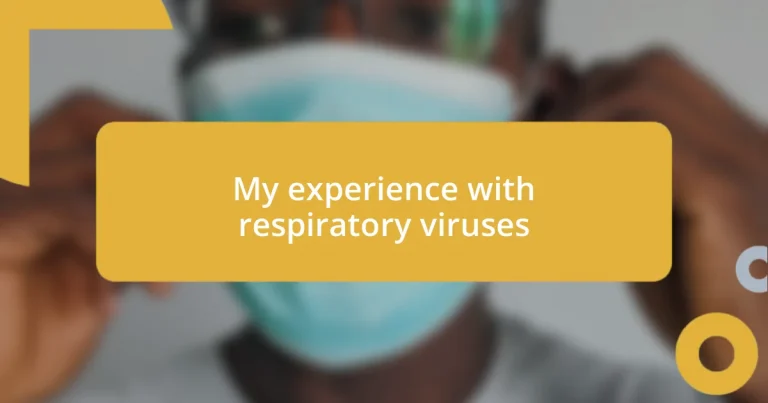Key takeaways:
- Respiratory viruses, such as influenza and coronaviruses, can cause a wide range of symptoms, and understanding their effects is crucial for protection and prevention.
- Effective preventive measures include good hygiene practices, vaccinations, and staying informed about circulating viruses, which can significantly reduce the risk of infection.
- Long-term effects of respiratory viruses can include persistent fatigue, breathing difficulties, and mental health challenges, highlighting the need for comprehensive care and awareness.
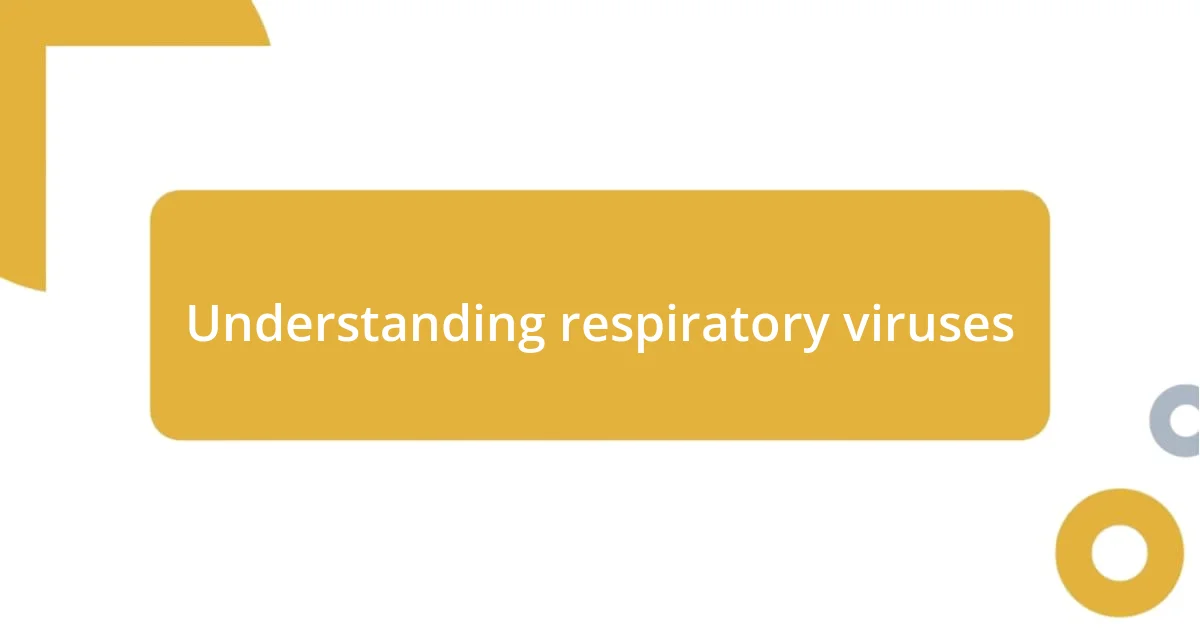
Understanding respiratory viruses
Respiratory viruses are tiny invaders that can cause a range of illnesses, from mild colds to severe respiratory infections. I remember the first time I caught a particularly nasty virus; I kept wondering how something so small could make me feel so awful. It’s fascinating—and a bit unsettling—how easily these pathogens can spread, often through simple actions like sneezing or coughing.
When I think about what respiratory viruses do to our bodies, I can’t help but feel a mix of admiration and concern. They invade our respiratory tract, triggering our immune response, which is why we often experience inflammation and discomfort. Have you ever felt your throat tighten or your chest become heavy? It’s that reaction of our body fighting back, and it can be quite a struggle.
Understanding these viruses isn’t just about symptoms; it’s about knowing how to protect ourselves and others. During one particularly bad flu season, I made it a priority to wash my hands frequently and wear masks in crowded places. I quickly learned that these small actions can significantly impact the spread of respiratory viruses. Isn’t it empowering to realize we have tools at our disposal to fight these invisible foes?
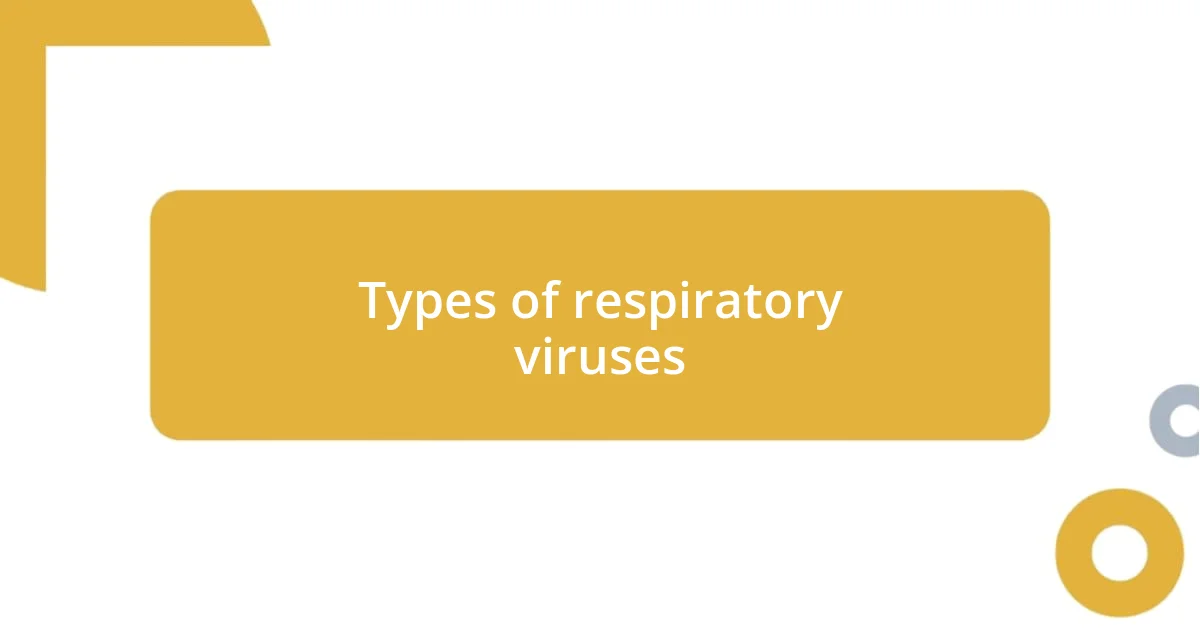
Types of respiratory viruses
When we delve into the types of respiratory viruses, it’s interesting to note that there are several prominent categories. For instance, influenza viruses are notorious during winter months, often causing widespread illness. I can vividly recall how my family was knocked down during one particularly brutal flu season. One by one, we fell ill, and it became a challenge to keep up with the demands of everyday life while managing fevers and fatigue.
Another group to consider is the common cold viruses, such as rhinoviruses, which typically lead to milder symptoms. I’ve had my fair share of colds, and they always seem to sneak up on me when I’m least prepared. It’s almost humorous how I can go from feeling perfectly healthy to completely congested within a matter of hours. They remind me of pesky little gremlins—annoying yet surprisingly easy to overlook until they show up uninvited.
Lastly, there are coronaviruses, which gained significant attention recently. My initial encounter with a coronavirus left me feeling uneasy and anxious. The sheer uncertainty surrounding its impact was overwhelming. Understanding these diverse types of respiratory viruses empowers us to recognize symptoms earlier and take preventive measures to mitigate their effects. Isn’t it reassuring to know that knowledge can be our best defense against these unseen threats?
| Virus Type | Common Symptoms |
|---|---|
| Influenza | Fever, body aches, fatigue |
| Common Cold (Rhinovirus) | Runny nose, sneezing, mild cough |
| Coronaviruses | Fever, cough, shortness of breath |
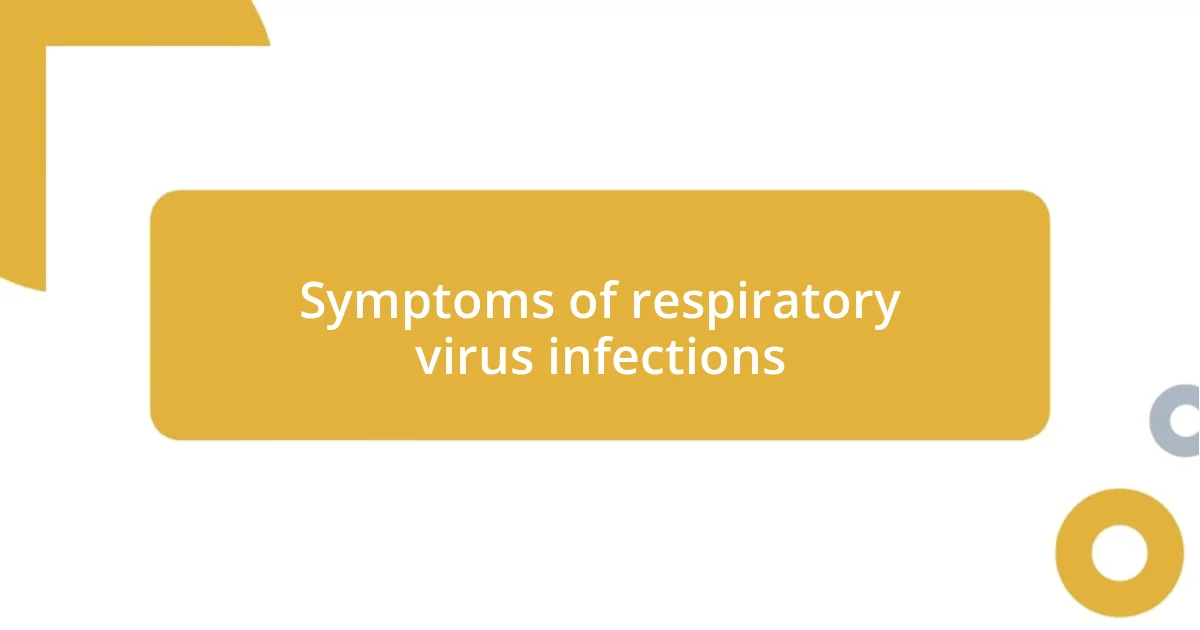
Symptoms of respiratory virus infections
Respiratory virus infections often bring a mixed bag of symptoms, ranging from mild discomfort to severe distress. I’ll never forget the feeling of waking up with a scratchy throat, only to realize the day would unfold into waves of fever and chills. It’s unsettling how quickly your normal routine can be disrupted, turning simple tasks into monumental efforts. Just knowing that something so microscopic could wield such power over your body is humbling.
Here’s a concise look at common symptoms I’ve encountered with these infections:
- Cough (dry or productive)
- Sore throat
- Congestion or runny nose
- Headaches
- Muscle aches and fatigue
- Fever and chills
- Shortness of breath
Each symptom, like a puzzle piece, contributes to the overall experience of illness. I remember once being surprised by how my sense of smell seemed to vanish overnight. That isolated sensation, coupled with the heaviness in my chest, set the stage for what felt like an arduous battle. Adding to the complexity, some symptoms can linger long after the virus has run its course, leaving you physically drained and emotionally frustrated. That’s a journey I’m sure many can relate to—a reminder of how the effects of respiratory viruses extend beyond the initial infection.

My personal experience and insights
It’s curious how a simple virus can uproot life so drastically. I remember one winter when I caught a nasty flu that had been circulating. I felt fine one moment, and the next, I was buried under blankets, shivering and questioning how I could have let my guard down. Have you ever had a similar experience? It’s astonishing how quickly our bodies can succumb to these invisible invaders.
Alongside physical symptoms, the emotional toll of battling respiratory viruses can be intense. I found myself feeling a sweeping wave of frustration when I couldn’t muster the energy to do the things I love. The sheer impact on my mental health became clear. I realized that illness isn’t just a physical imbalance; it also rattles our emotional well-being, leaving a lingering sense of vulnerability. Isn’t it enlightening to think about how intertwined our physical and emotional states really are?
There’s one instance that still sticks with me. After recovering from a particularly nasty cold, I got a sudden rush of joy when I could finally smell my morning coffee again. It was such a small thing, yet it felt monumental. Those moments of rediscovering the little pleasures are precious reminders that even after we’ve faced such discomfort, life’s simple joys can reignite hope and normalcy. Don’t you think those small victories are worth celebrating?
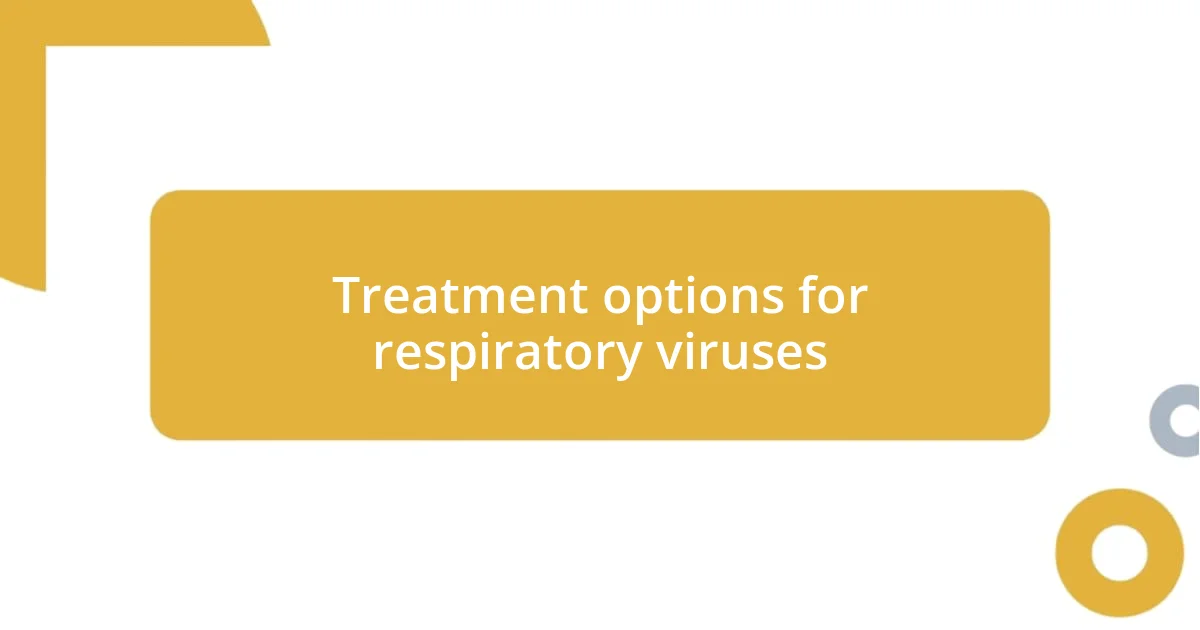
Treatment options for respiratory viruses
When it comes to treating respiratory viruses, I’ve learned that the approach often varies based on the severity and symptoms. For mild cases, home remedies like staying hydrated and consuming warm teas can be surprisingly effective. I remember brewing a steaming cup of ginger tea during one of my bouts; not only did it help soothe my sore throat, but the aroma alone was comforting. Have you ever found solace in a simple remedy like that?
For more serious symptoms, over-the-counter medications can provide relief. Antipyretics, such as acetaminophen, can help alleviate fever and body aches, while decongestants might ease that relentless stuffiness. I often kept a stash of lozenges handy, as they helped soothe my throat and made swallowing less of a chore. Isn’t it fascinating how these small interventions can make such a big difference in our comfort during illness?
In some cases, especially when dealing with persistent cough or significant shortness of breath, it’s wise to consult with a healthcare provider. I learned the hard way that ignoring these symptoms can lead to complications. Once, during a particularly heavy cold, my doctor prescribed a bronchodilator to ease my breathing—it was a game changer. Have you ever felt that relief wash over you when professional help made a difference? It’s a powerful reminder that addressing our health comprehensively is crucial for recovery.
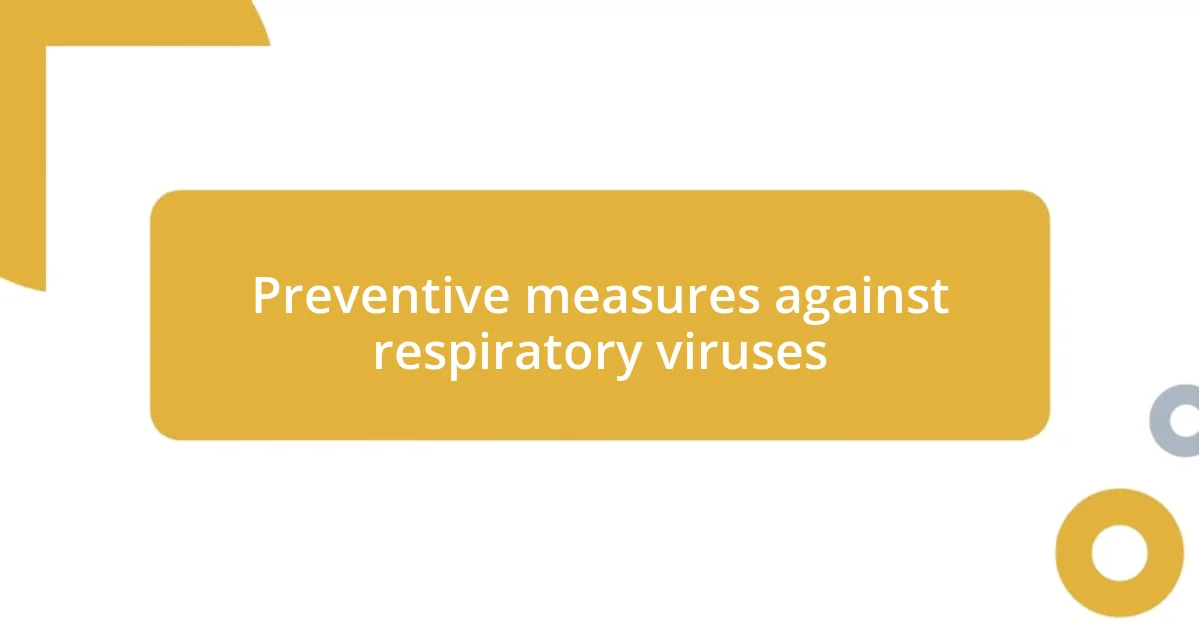
Preventive measures against respiratory viruses
One of the most effective preventive measures against respiratory viruses is practicing good hygiene. I’ve always made it a habit to wash my hands thoroughly, especially after being in public places. There was one time when I attended a crowded event and immediately felt the anxiety of potential germs creeping in. That’s when I realized just how powerful simple handwashing is in protecting ourselves—it’s like a first line of defense. Have you ever thought about how many times you touch your face in a day? It’s startling!
Vaccinations also play a crucial role in prevention. I remember the sense of security I felt after getting my annual flu shot. It was a straightforward process, yet it equipped me with an extra layer of protection during that peak season. It dawned on me how collective efforts, like getting vaccinated, can create a shield of immunity in our communities. Isn’t it empowering to think that a single act can contribute to larger public health benefits?
Staying informed about the viruses circulating during certain seasons is another preventive step I’ve found useful. I recall a winter when I kept a close eye on local health alerts, which helped me avoid crowded places during a surge of infections. This proactive approach not only helped me stay healthier but also alleviated my anxiety about falling ill again. Do you keep track of health advisories? Understanding the trends can turn awareness into action, which I believe is truly empowering.
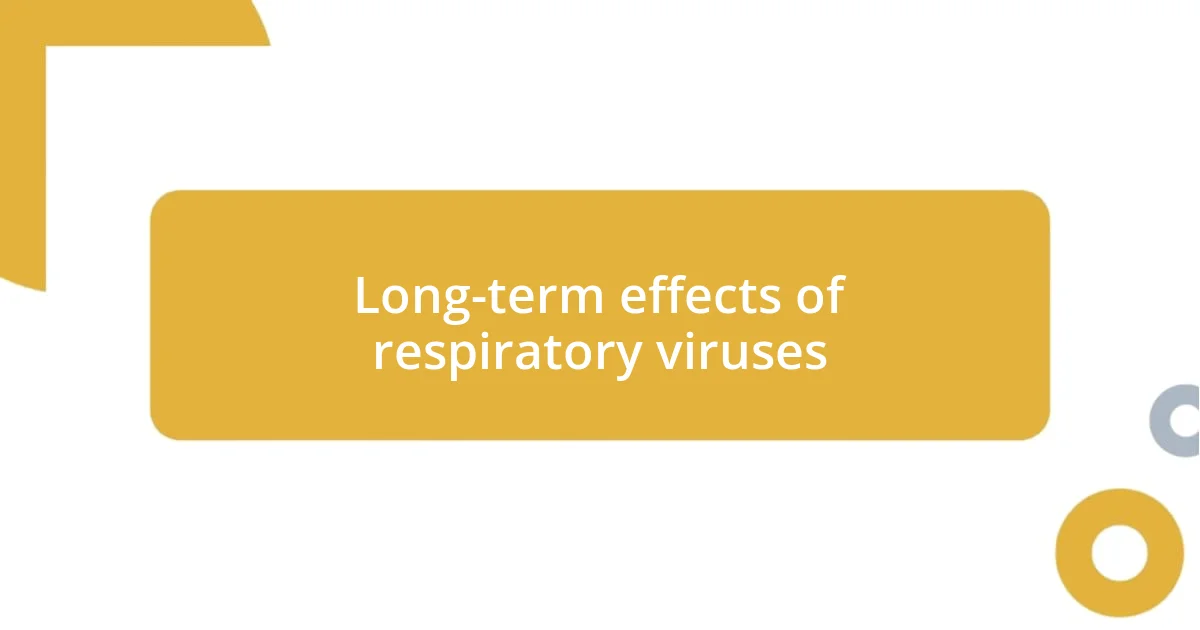
Long-term effects of respiratory viruses
Long-term effects of respiratory viruses can linger far beyond the initial infection. I’ve seen this firsthand when my colleague struggled with persistent fatigue and shortness of breath months after recovering from COVID-19. It was surprising to witness someone who once thrived now facing challenges that seemed to come out of nowhere. Have you ever heard someone describe their experience like that? It’s eye-opening.
Another aspect is the potential for lung health deterioration. After battling a severe respiratory virus, I noticed a shift in my own breathing patterns. It wasn’t just me; research shows that some individuals may experience chronic cough or asthma-like symptoms long after the virus needs assistance. I often wonder if these lingering effects catch us off guard—our bodies can be resilient, but they also need time to heal.
Mental health shouldn’t be ignored either. The stress and anxiety that accompany the fear of long-term health implications can weigh heavily on a person. Personally, I remember feeling a wave of worry every time I took a deep breath, questioning if I would ever feel completely normal again. Have you ever felt that sense of uncertainty? It’s sobering to think that a respiratory virus could not only affect our physical health but also our mental well-being, lasting for months or even years.












